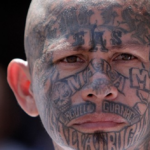A new report from human rights experts urges the United Nations to condemn the “evaporation of fundamental rights” in the United States, where the Trump administration is using high-tech surveillance tools and a nebulous “anti-terrorism” legal framework that has ballooned since 9/11 to weaponize law enforcement against social movements that challenge state power.
While the legally dubious arrests of pro-Palestine student activists and the wrongful deportation of Kilmar Abrego García along with other immigrants to a notorious prison in El Salvador have received the most media attention, these cases provide only a peek into the expanding surveillance dragnet President Donald Trump and his appointees have at their disposal, which includes tools capable of sucking up an unprecedented amount of online personal data.
“The human rights violations described in the report make clear that the U.S. is in an authoritarian political reality where the Trump administration, Congress, and state governments have fully suspended international human rights and are engaging in tactics of repression that are hallmarks of fascist regimes,” said Nadia Ben-Youssef, advocacy director of the Center for Constitutional Rights, in a statement.
Released on April 24 by the Georgetown Law Center on Privacy & Technology; the University of Dayton Human Rights Center; the University of California, Irvine School of Law; and a coalition of civil liberties groups, the report highlights alleged violations of international human rights law under the Trump administration and outlines a vast surveillance apparatus used to repress freedom of expression. The report was submitted to the UN Human Rights Council, which is scheduled for a regular review of U.S. human rights commitments in November. The Trump administration withdrew the U.S. from the council in February, as he did in his first administration.
The report points to Trump’s jailing of migrants at the Guantánamo Bay offshore prison camp and his invocation of the Alien Enemies Act to deport hundreds of people to a notorious prison in El Salvador as clear violations of due process rights under U.S. and international law. Courts have attempted to block Trump’s immigration spectacle, and officials were forced to return the migrants flown to Guantánamo Bay, but the administration has courted a constitutional crisis by refusing to return García and other men sent to El Salvador despite court orders.
However, it’s the disappearing of student activists, legal U.S. residents, and even U.S. citizens into the byzantine system of immigration jails that has most alarmed the broader public, particularly after Trump said that he hopes to deport U.S. citizens accused of crimes to El Salvador’s infamous Terrorism Confinement Center (CECOT) prison as well.
After a police crackdown on pro-Palestine protests during the Biden administration led to the arrests of more than 3,000 people on campuses nationwide, the Trump administration revoked visas of at least 1,800 students. At least eight have been targeted for arrest. Facing multiple lawsuits and a string of legal setbacks, the administration abruptly changed course and announced in federal court on Friday that it would restore thousands of foreign college students to “active status” in a key federal database, which is required to study and work off-campus.
The ongoing targeting of pro-Palestinian activists for arrest and deportation violates international laws that protect non-citizens in any country from arbitrary expulsion based on political expression, not to mention the First Amendment of the Constitution, according to the report.
The report points to Columbia graduate Mahmoud Khalil and doctoral student Ranjani Srinivasan, who both were targeted after participating in pro-Palestinian activism on campus. After pleading for help from the university, Srinivasan fled to Canada as Homeland Security Secretary Kristi Noem called her a “terrorist sympathizer” on social media without evidence.
Khalil, who has a green card, was arrested in early March by plainclothes federal agents who came to the campus apartment he shared with his wife, who was pregnant at the time. Khalil now sits thousands of miles away in a rural Louisiana immigration jail. A recognizable and explicitly nonviolent organizer who did not wear a mask to protests, Khalil has not been charged with any crime but was labeled by supporters of Israel’s war on Gaza as a supporter of the militant group and political party Hamas.
Khalil denies any connection with Hamas, and his lawyers now say he was arrested without a warrant. In new court filings this week, attorneys for the administration claimed Khalil was arrested and transferred out of state after he attempted to flee, a claim contradicted by testimony and video from Khalil’s wife, who was there at the time of arrest. She has since given birth to a son while Khalil’s lawyers fight for his release and against deportation.
Marc Van Der Hout, an attorney for Khalil, said it’s “completely outrageous” that the Trump administration attempted to argue in court and the media that there was a warrant for Khalil’s surprise arrest, which quickly became global news.
“In DHS’ filing in immigration court this week, we learned for the first time that the DHS agents who arrested Mahmoud lied to him: they wrote in their arrest report that the agents told him that they had an arrest warrant, but DHS has now admitted in their filing that that was a lie and that there was no warrant at all at the time of the arrest,” Van Der Hout said in a statement on Thursday.
In a statement about the report to the UN, Reem Subei, a senior staff attorney at the civil rights group Muslim Advocates, said the issue isn’t that the U.S. is failing to uphold basic rights, but that the government is making “a calculated use of state power to punish political dissent.”
“Through forced disappearances and deportations, pervasive surveillance and criminal charges, authorities are targeting students and advocates — especially those organizing for Palestinian liberation — as a means of isolating and dismantling a global movement,” Subei said. The targeting of activists violates international law and reinforces a longstanding pattern of racialized oppression in the U.S., she added.
That oppression intensified for Muslim communities after the 9/11 attacks. During the so-called “war on terror,” the U.S. government massively expanded the surveillance state at the expense of privacy rights and civil liberties. Indeed, the authoritarian “anti-terror” apparatus that Trump controls today is rooted in decades of pro-Israel foreign policy that has stigmatized Palestinians as “terrorists” since 1967.
“The UN must recognize this not as a series of isolated incidents, but as a systemic effort to suppress expression, assembly, and solidarity across borders,” Subei said.
What remains unanswered in many of these cases is how the government identified, tracked down, and targeted immigrants and activists in the first place. According to the report, digital surveillance in the U.S. is so comprehensive that people reasonably fear taking action that could invite government intrusion into their lives or the lives of people they associate with, which violates principles of freedom of expression. Both law enforcement and private right-wing groups used facial recognition technology to identify activists during anti-genocide protests, which has led to protests by students demanding free speech protections.
To track down targets for deportation, immigration police are using social media scanning tools to geolocate individuals and identify home addresses by accessing license plate databases, utility billing databases, app-based location data, and other online data sold by private data brokers, according to the report. The Department of Homeland Security now forces all detainees suspected — but not necessarily convicted — of violating immigration law to submit DNA samples, and the government added the DNA of 1.5 million people to its central database between 2020 and 2024.
While non-citizens are the target of such efforts, everyone’s data is sucked into various digital dragnets operated by the federal government and law enforcement agencies at every level. Technology such as smartphones, app-based location tools, automated license plate readers and artificial intelligence has made such surveillance ubiquitous as the Trump regime puts its agenda into action.
Known as the “data-broker loophole,” law enforcement in the U.S. has long argued it can legally gather private online data without a search warrant because the data is purchased by private companies. Such digital surveillance strategies have already been used by the U.S. government to surveil users of Muslim dating and prayer apps and participants in the 2020 protests for racial justice. In 2022, Democrats in Congress demanded that private data brokers stop selling the personal information of people who visit abortion clinics. According to the report:
Smart cameras and [automatic license plate readers] enable law enforcement to track, in some cases, the entirety of people’s public movements; entities from the military to local police have contracted with social media surveillance firms access to surveil people engaging in free expression. AI technology also enables law enforcement to comb through and analyze troves of data to invade the public’s privacy at levels that would have been prohibitively expensive or simply impossible just a decade ago.
Digital tools are not always precise, however; multiple U.S. citizens have received emails from the Trump administration demanding they leave the country. More people may have received similar emails but have not come forward in the media.
“Our hope is that the report sounds the alarm for the international community to act with greater urgency to challenge this administration and its belligerent efforts to dismantle constitutional protections and international norms,” Ben-Youssef said.
Angry, shocked, overwhelmed? Take action: Support independent media.
We’ve borne witness to a chaotic first few months in Trump’s presidency.
Over the last months, each executive order has delivered shock and bewilderment — a core part of a strategy to make the right-wing turn feel inevitable and overwhelming. But, as organizer Sandra Avalos implored us to remember in Truthout last November, “Together, we are more powerful than Trump.”
Indeed, the Trump administration is pushing through executive orders, but — as we’ve reported at Truthout — many are in legal limbo and face court challenges from unions and civil rights groups. Efforts to quash anti-racist teaching and DEI programs are stalled by education faculty, staff, and students refusing to comply. And communities across the country are coming together to raise the alarm on ICE raids, inform neighbors of their civil rights, and protect each other in moving shows of solidarity.
It will be a long fight ahead. And as nonprofit movement media, Truthout plans to be there documenting and uplifting resistance.
As we undertake this life-sustaining work, we appeal for your support. Please, if you find value in what we do, join our community of sustainers by making a monthly or one-time gift.
Read full article at source
Stay informed about this story by subscribing to our regular Newsletter


